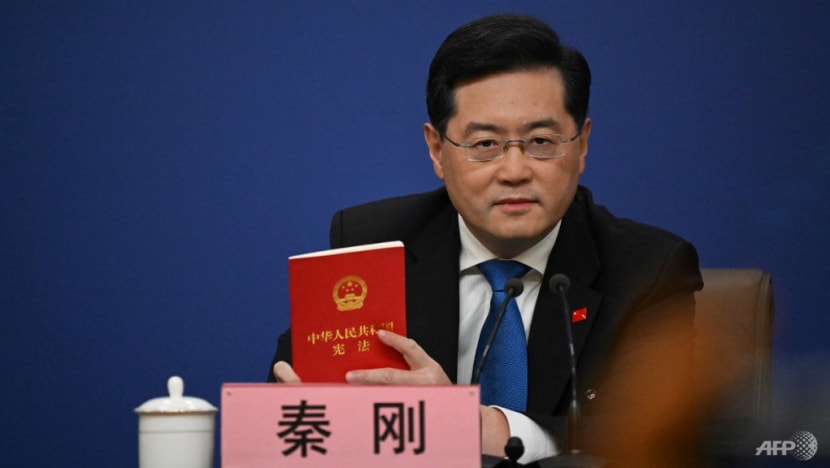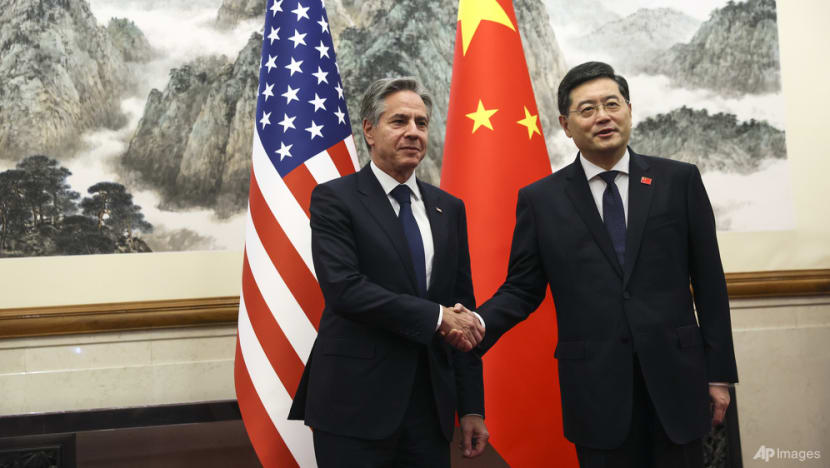Commentary: Chinese Foreign Minister Qin Gang’s disappearance draws scrutiny
The prolonged absence of Chinese Foreign Minister Qin Gang underscores serious dilemmas for President Xi Jinping, says political observer Bo Zhiyue.

WELLINGTON: Chinese Foreign Minister Qin Gang has vanished from public view for more than three weeks, sparking speculation inside and outside of China about his whereabouts. With the extended absence of China’s foreign minister, it is hard for President Xi Jinping to project China as a country of global influence.
Qin’s last public appearances were in Beijing on Jun 25 when he met with officials from Vietnam, Russia and Sri Lanka. Since then, he has cancelled several meetings and sat out the annual Association of Southeast Asian Nations (ASEAN) gathering of foreign ministers in Indonesia last week. His line manager, ex-foreign minister, and current Politburo member, Wang Yi, attended the meetings on his behalf.
The official line provided by the Chinese foreign ministry for Qin missing the ASEAN meetings was “health reasons”. There were no details on the nature of his ailment.
But his prolonged absence has not gone unnoticed, sparking a flurry of commentary about his whereabouts and the state of China’s international relations during a particularly busy diplomatic period.
Where is Qin Gang, and what has happened to him?
POSSIBLE REASONS BEHIND QIN GANG’S ABSENCE
China is notoriously secretive about the health of its leaders. When asked on Jul 7 for a response to an article in US political news website Politico citing speculation about Qin’s health, Chinese foreign ministry spokesman Wang Wenbin said he “had not heard” about the report.
Four days later, Wang confirmed that Qin would not attend the ASEAN meetings because of health reasons.
If Qin had indeed taken ill, it’s likely that he’d have gone back to work within a few days.
Unsubstantiated reports, however, have started circulating that Qin’s absence is linked to an alleged affair with a journalist, with whom he is said to have a child out of wedlock.
Fu Xiaotian, who was born in China and educated at Cambridge University, is a presenter and producer of Talk with World Leaders at Hong Kong media outlet Phoenix TV. She gave birth to her son, Er-Kin, in November last year in the United States.
A screenshot of a Weibo post purportedly made by Fu on the eve of Mar 19 - Qin’s 57th birthday - contained a note wishing her son’s father “Happy Birthday”.
If the speculation about an extramarital affair is true, Qin may have fallen out of political favour. While adultery is not a crime in China, the Chinese Communist Party’s rules prohibit its members from “having improper sexual relationship with others”.
Lei Zhengfu, former party secretary of Beibei District in Chongqing Municipality, was sentenced to 13 years in jail in 2013 for bribery after a sex tape featuring him had been put online the year earlier.
But it is rare that a high-ranking official is sidelined simply because of sexual misconduct.
Zhang Gaoli, former Politburo Standing Committee member and former executive vice premier, has not been officially investigated for adultery even though Chinese tennis star Peng Shuai openly alleged in 2021 that she had been sexually assaulted by him. She was absent from public view for a few weeks, and later denied having made the accusation.
XI JINPING’S DILEMMA
Qin’s alleged extramarital affair could be dismissed as a rumour if Xi has enough confidence in him.
But Xi is now in an awkward position.
Relations between China and the US have been tense for years, worsening after a suspected Chinese spy balloon was shot down by a US fighter jet over the Atlantic in February. The two sides resumed dialogue in June, with United States Secretary of State Antony Blinken meeting Qin, Wang and President Xi during a long-delayed visit to China.
Qin, known for his aggressive approach as one of China’s “wolf warrior" diplomats, has had a meteoric rise through the ranks.

A trusted aide of Xi, any whiff of impropriety would reflect badly on Xi too. After all, it is impossible for Qin to have been appointed Chinese foreign minister and state councillor without Xi’s strong personal endorsement.
Qin’s rise in Chinese diplomacy and political hierarchy has been rare, if not unprecedented. He had served as Chinese ambassador to the United States for less than two years before being appointed Chinese foreign minister, and was made a full member of the 20th Central Committee of the Chinese Communist Party without having been an alternate member.
Qin was also made a state councillor in March 2023, less than three months after his appointment as Chinese foreign minister.
His immediate predecessor, Wang Yi, took 12 years to go from a vice minister of foreign affairs to minister of foreign affairs, and another five years to be promoted to state councillor.
One of Qin’s predecessors as Chinese ambassador to the United States, Li Zhaoxing, served as vice minister and party secretary of foreign affairs after his assignment in the US for three years before being appointed foreign minister.
If there were to be any wrongdoing on Qin’s part, Xi would be in an extremely politically sensitive position.
If he tries to protect Qin, Xi would lose his credibility as a leader of integrity. If he dismisses Qin, he would lose his credibility as a leader who protects his loyal subordinates.
It would also be difficult to find a replacement for Qin’s position. The party boss of the Ministry of Foreign Affairs is Qi Yu, who while politically reliable, does not have any experience in foreign affairs.
Executive Deputy Foreign Minister Ma Zhaoxu could be a candidate, but his political credentials are a bit too weak. He is not even an alternate member of the 20th Central Committee. Of course, Xi could transfer Liu Jianchao, head of the International Liaison Department of the Chinese Communist Party Central Committee, to the Ministry of Foreign Affairs.
Finally, Qin’s problems have highlighted a fundamental flaw in Xi’s style of personnel management. Xi takes political loyalty as the most important criterion for selecting top officials but he also wants to project an image of being impartial.
Loyalists, however, are not necessarily clean officials. Once Xi starts to clean up his loyalists for corruption issues, he loses their absolute loyalty.
Professor Bo Zhiyue is the founder and president of the Bo Zhiyue China Institute, a consulting firm providing services to government leaders and CEOs of multinational corporations, and an author on China’s elite politics.


















